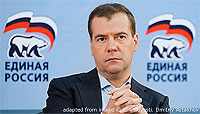United Russia: Time for change?

(Russia Beyond the Headlines – rbth.ru – Marina Obrazkova, RBTH – October 11, 2013
Experts advise the ruling party of Putin and Medvedev to resolve practical problems.
Last week’s United Russia congress demonstrated that the ruling party remains the nation’s leading political force and has no viable rivals. Nevertheless, experts believe United Russia will need to change fast or risk losing its dominance. The September 2014 elections to the Moscow City Duma will serve to gauge its popularity.
In a speech to congress delegates, Prime Minister Dmitry Medvedev, the United Russia leader, expressed satisfaction with the results of the recent regional elections: “The [United Russia] party has confirmed its right to leadership amid unprecedented political competition, which makes its performance even more meaningful.”
“The party has won renewed trust among the population in a whole number of regions, regaining power in Veliky Novgorod, the Irkutsk region, and Ryazan, where it lost to political rivals two years ago,” said Medvedev.
Despite the prime minister’s upbeat tone, political observers have pointed out that the presence of the country’s leaders at the congress and speeches by other delegates suggested that the party would continue to exist in its habitual format.
Franz Klintsevich, a member of the presidium of the United Russia General Council, believes the political movement could grow, thanks to the inflow of new members that is taking place right now.
“The party has occupied the leading position in Russian politics for 15 years. Its members have formed government bodies at all levels. United Russia’s place has been clearly defined, and it’s unlikely that any other force will be able to compete with it,” said Klintsevich.
Yet, prior to the congress, experts were far from sure of this political force’s bright future. There was speculation that it might be replaced with another one, such as the Popular Front All-Russia Movement a coalition of public and political organizations that was established in May 2011 on the initiative of President Vladimir Putin.
“Until recently, the conventional wisdom was that United Russia would be replaced by the Popular Front, or some other movement. But is has become clear, since the September elections, that nobody is in a hurry to get rid of the [United Russia] party. Despite a number of high-profile setbacks, the party did a good job overall,” said Pavel Salin, director of the Political Studies Center at the Financial University of the Russian government.
Leonid Polyakov, head of the political science department at the Higher School of Economics, agrees, noting that the party had even improved its election performance despite intensified political competition.
“The single voting day and the congress that has just finished have demonstrated that the party has improved its performance compared to December 2011. It still has no rivals, and its electoral base bringing it the winning votes is still in place although there’s an emerging critical mass of politically active citizens who give their votes to new participants in the political process,” Polyakov said.
Igor Bunin, director of the Center for Political Technologies, notes the main achievement of the ruling party as its markedly slower decline in relation to any other parliamentary party; yet changes will be necessary for it to make any progress.
According to Bunin, United Russia will start losing its clout, but, since it is closely related to power, it will continue to receive 2530 percent of the vote for now.
“The slide will be slow. The main problem is that the population is losing interest in politics, and the political sphere itself is degenerating fast. Only two social groups remain active: residents of large urban centers, and pensioners and public servants, who are accustomed to voting. Other social groups have yet to find their political leaders,” said the director.
Bunin believes that these two groups will decide the fate of the nation, until the balance is upset by a severe deterioration in the economic situation or by the activities of other leaders.
The September 2014 elections to the Moscow City Duma will be the next test for United Russia. “The party’s brand will be represented directly, unlike in the mayoral elections, where Sergei Sobyanin ran as an independent,” Polyakov said.
In order for the party to get the maximum number of votes, it will still have to change beyond the rotation of cadres. “Every party cell should find real local leaders and resolve some practical problems,” said the political scientist.
Salin believes that the party itself is its own main rival. “Weariness of any political force accumulates over time,” he said. “United Russia has to change its visuals, some of its public speakers, and its styling.”
Article also appeared at http://rbth.ru/politics/2013/10/11/united_russia_time_for_change_30713.html
[featured image is file photo]
